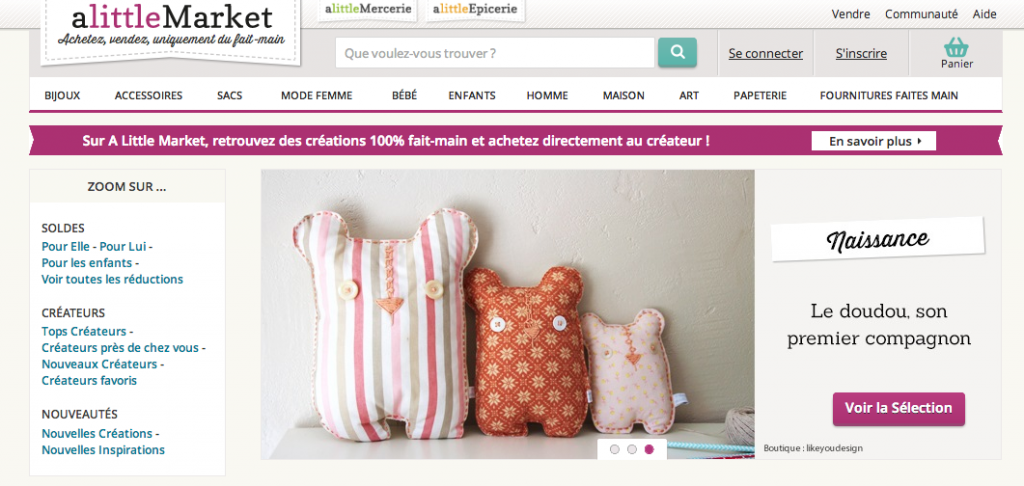Deploying Algolia to Search on more than 2 Million Products
11 Jul 2014The following post is an interview of Vincent Paulin, R&D Manager at A Little Market (recently acquired by Etsy).
As a fast growing ecommerce site for handmade goods in France, A Little Market has seen its marketplace grow from a few thousand to over 2 million products in just 5 years. With 90,000 designers and artisans using A Little Market marketplace to buy, sell and collaborate, search quickly became a major part of their ecommerce strategy and user experience.
What did you have in place as a search solution?
"We implemented a Solr based search 5 years ago and had been trying to tweak it to fit our growing needs. We had selected this system for its flexibility, however, over time, that flexibility translated into constant maintenance, modifications and lower relevance in our search results.
Then we investigated Elasticsearch. It is complex, yet powerful. As I was diving deeper into Elasticsearch I realized that I could quickly gain an "ok" search experience; however, a powerful search experience would mean investing more time than we had to configure it. Then I did a little math: learning the platform would take a few weeks, configuring servers - a few days, and configuring and tuning semantic search perfectly - several months.
Then we found Algolia. We only had 3 months and knew Algolia would be much easier to implement, so we A/B tested everything to see how it would impact the search experience.
Can you tell us more about your integration process?
The first thing we wanted to get done was to reference all the shops and our best searches to make an autosuggest widget. Building this autosuggest with a basic configuration took us 2 days.
Then we built an automatic task to aggregate shops and best searches every day and configure Algolia indices. We also took on the task to create the front javascript plugin. With the Algolia documentation and the examples on Github it took us less than 1 hour.
The results of this first test were very encouraging. With around 500k requests per day, the response time was about 4 milliseconds on average and we saw the conversion rate multiplied by 3 compared to the previous conversion rate with a search bar with "no suggest". For A Little Mercerie, another marketplace we manage, the improvement was about 4 times greater.
After this first test, we were ready to fully commit to Algolia for our whole search experience. The first step was to create a script to index our entire product database in Algolia. This was easy to do with batch insert in Algolia indices. We selected some attributes of our products such as the title, categories, materials and colors to be indexed. That was a first try. We wanted it to be quick and simple.
With the help of the open source demo code we developed a full JS sandbox which can display paginated results with faceting to show the progress to the team. In less than a week, we had a fully working sandbox and the results were promising. Our query time averaged less than 20 milliseconds on 2 millions records. With confidence we started to upgrade the algorithm on Algolia, test it, again and again, adding some attributes to index such as specific events (christmas, valentine's day), custom tags, etc.
In addition, we implemented sorted results. They are really relevant with the new numeric ranking option in settings. At that step we were able to sort results by price, date, etc. You must create a specific index for each specific ranking you need. We also created a different index for each language (French and Italian) and took this opportunity to do the same across our other websites, alittlemercerie.com and alittleepicerie.com.
To do this we created a custom API which abstracts the use of any kind of search engine for all API clients. We end up losing the real-time search but we need that for now in order to abstract everything and to collect data before sending the results.
The next step was to erase the "no results" pages. For that, we were progressively adding the last words of the query as optional words until we had somes results.We never set as optional all the user queries. We set at least the first word or the first two words.
When search was ready, we still had plenty of time left to implement it on our clients' applications. We took more time than was needed to implement Algolia. The speed of iteration with the Algolia API enables us to test everything in a much shorter timeframe.
How has Algolia's API helped search on A Little Market?
We are now able to answer more than 500/1000 requests per minute and we add 6000 new products every day to the search engine while over 3000 are removed, in real time.
After this integration of the Algolia API, we saw an increase in our conversion rate on search by 10%. This represents tens thousands of euros in turnover per month for us. In a few weeks of work with one engineer, we had replaced our main search engine for a better solution thanks to Algolia."
